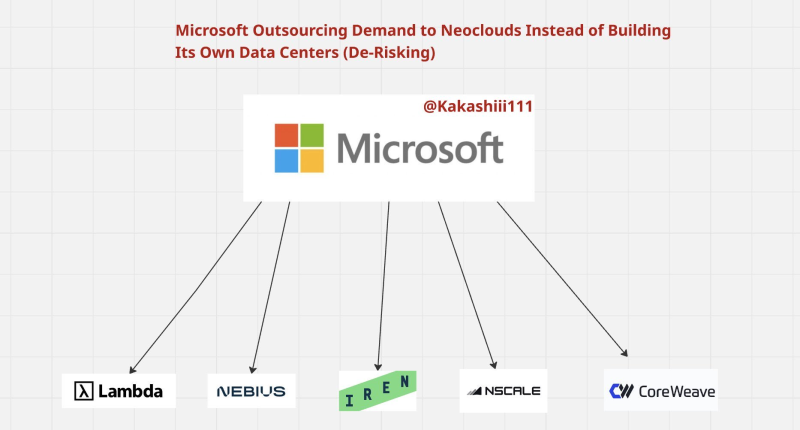● In a detailed thread by Kakashii, Microsoft's AI infrastructure strategy reveals a significant pivot toward financial caution. Instead of spending billions on new data centers, the company is outsourcing compute needs to independent neocloud operators like CoreWeave, Lambda, Nebius, IREN, and NScale. This lets Microsoft handle growing AI workloads for OpenAI and others without locking in massive long-term investments.

● Microsoft executives have become cautious about overbuilding after seeing idle GPUs and questioning OpenAI's optimistic demand forecasts. CEO Satya Nadella even admitted that "some GPUs are sitting idle, collecting dust" — a clear sign of overcapacity. By leasing instead of owning, Microsoft keeps its options open while limiting financial risk.
● The arrangement works through short-term, flexible agreements that Microsoft can terminate anytime, pushing hardware depreciation and debt onto the neocloud partners. These partners — many backed by NVIDIA — host and manage GPU clusters that Microsoft rents on demand. As Kakashii explains, "They simply lease compute capacity and can walk away once demand starts to weaken," protecting Microsoft from downturns.
● The financial benefits are significant. Instead of tens of billions in capital expenditure, Microsoft only pays for what it uses, preserving cash and avoiding hardware obsolescence. For NVIDIA, which supplies these neoclouds, the risk is manageable — GPU demand continues, and investors are likely to overlook write-offs given AI's explosive growth.
● This represents a fundamental shift in cloud economics. Rather than scaling through ownership, companies like Microsoft are adopting a distributed model that transfers costs, debt, and maintenance to specialized infrastructure startups. This de-risking strategy protects margins and reshapes how the AI compute ecosystem will grow in the years ahead.
 Eseandre Mordi
Eseandre Mordi

 Eseandre Mordi
Eseandre Mordi


